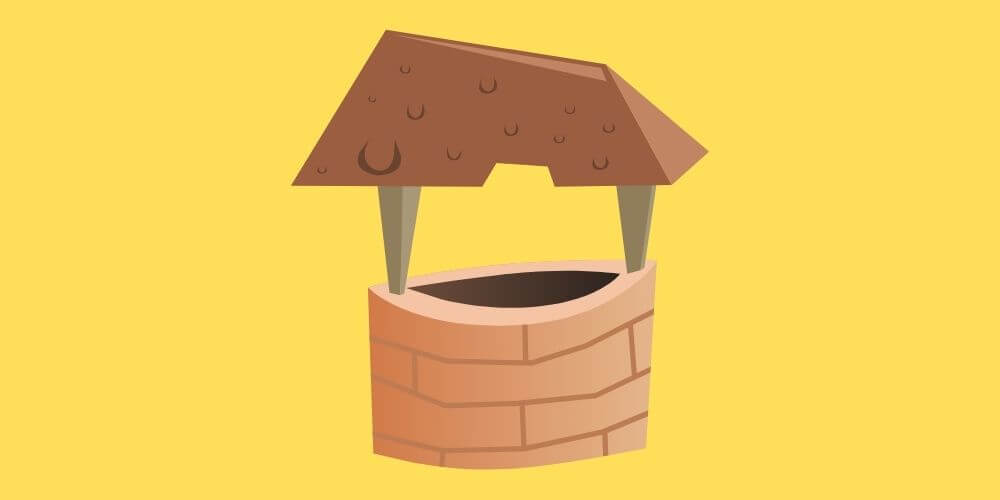If you are a homeowner and are thinking about having a well drilled on your property, you may be wondering what the cost will be. Unfortunately, there is no one definitive answer to that question.

The cost of drilling a well can vary widely, depending on factors such as the depth of the well and the type of soil it is drilled in. However, there are some general prices you can expect to pay for if you have a well dug on your property.
Keep reading to learn more.
Different types of wells
The first thing to keep in mind when it comes to the price of well drilling is that there are different types of wells.
The first type, and the most common kind of well, is a private water well:
A private water well is one that is drilled and maintained by a homeowner and provides the only water source for the home. If you are interested in a well, it is likely that this will be the kind of water source you want.
The second type of well is a community or shared well:
A community or shared well provides water for more than one home, such as in a particular subdivision or development. This well is owned and maintained by a public or private entity and not the individual homeowners.
The third type of well is a public water supply well:
A public water supply well is one that provides the sole source of water for a city or other municipality. This allows the government to provide water to the public in case of emergencies.
The depth of your well will also affect its cost. A private water well is typically drilled to a depth of around 50 feet. A community or shared well can be drilled to depths of 300 feet or more, while public water supply wells can be up to 1,000 feet deep.
So how much will it cost to have these wells drilled?
Well, there are several factors that go into determining the final price of well drilling, including:
- Distance from surface water (if any).
- The average depth of your proposed location’s subsoil.
- Type of subsoil.
- Amount of overburden present (the amount of soil needed to be removed before reaching top soil).
- Availability of necessary permits.
- Depth to groundwater(depth at which you’ll hit water).
The average depth of well drilling is between 100 and 250 feet
According to the Water Well Drilling Industry Report, The average cost for well drilling is $4,900 in 2020. This price will vary depending on the following factors:
- Depth of the well ($20 – $25 per foot deep)
- Location ($10 per foot for rural areas; $30 per foot if the well must be drilled through rock)
It’s also important to keep in mind that there are many other costs involved with getting a private water well or shared community well drilled.
Below are estimates of the different price ranges based on well depth.
| Well Depth | 5” Diameter Casing |
|---|---|
| 100 | $3,650 |
| 150 | $5,500 |
| 200 | $7,250 |
| 250 | $9,000 |
| 300 | $10,750 |
| 350 | $13,100 |
| 400 | $14,900 |
Before contracting out your project, make sure you know exactly what these additional fees will include.
For example, some common expenses include:
- Pipe installation (if necessary)
- Annual testing fees
- Fees for maintaining the well, pump, and pressure tank
If you are interested in having a well drilled on your property, make sure you get quotes from different companies. But keep an eye on any hidden fees and get everything in writing before signing a contract
How deep should a well be for drinking water?
The depth at which you should drill your well depends on a variety of factors, including the availability of water and the quality of the water.
As a general rule, though, it is wise to drill your well below the depth at which groundwater starts.
For example, if you are in an area where the water table is around 50 feet deep, drilling your well deeper than that will give you better chances of finding good drinking water.
You can also test for minerals and contaminants using a water testing kit .
Can you drill your own well?
If you live in a rural area and do not need to build an expensive system around the well, then drilling your own is possible.
However, it is important to note that this option does come with some risk, as there are many potential dangers involved with drilling a well, including
- Falling into the hole.
- Drilling through contaminated water.
- Drilling into dangerous natural gas pockets.
- Oxygen depletion due to poor ventilation.
If you are not experienced with working at heights, proper tools, or the area in which you will be drilling then it is best not to drill your own well.
How long does drilling a well take?
When you think about getting a well drilled, how long do you imagine it will take?
Depending on the type of well, drilling can take anywhere from a few hours to a couple of days.
It will all depend on a variety of factors, including the depth of the well and the type of drilling equipment that is used. However, in general, wells can be drilled relatively quickly.
Drilling a well can be an involved process, but with the right equipment and know-how, it can be completed in a few days.
Will well water ever run out?
Your well will not run out of water as long as you maintain it properly and protect it from contamination.
You can use a water treatment system to ensure that your well and the pipes leading into your home are free of sediments, sediment particles, and other contaminants
You should also try to check the integrity of the well itself regularly. For example, you could conduct a pressure test or pull up some well water in a clean container and inspect it for any signs of contamination .
These precautions will ensure that you always have access to your wells water supply. However, if you live close to an industrial area then the groundwater may contain dangerous chemicals.
In this case, installing an effective water treatment system will be necessary in order for your family to safely drink from your wells source.
Final Thoughts
There are many factors that contribute to how much it costs to drill a well
Before signing any contracts, make sure you understand what is included in the price and whether or not there will be any additional fees before your project begins.
If you live in an area with clean groundwater then you might be able to drill your own well. However, if you are located near heavy industry or have weak ground, it is probably more sensible to pay for outside help
When planning the cost of drilling a well, keep these factors in mind so that you can choose the option that works best for your budget and needs.

